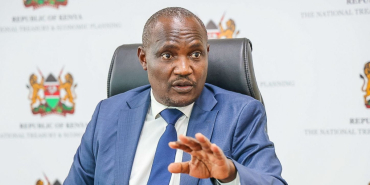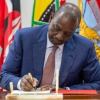Kenya Parliament Considers Social Media Feedback in National Budget Process

Kenya's National Assembly is considering a groundbreaking initiative to incorporate social media discussions into the public participation process for budget formulation.
This move comes as the country grapples with potential new tax measures to support the ambitious Sh4.26 trillion budget for the 2025/26 financial year. Kimani Kuria, chairperson of the Finance and National Planning Committee, revealed the committee's deliberations in an interview on NTV on April 8, 2025. Kuria emphasizes the need to modernize traditional engagement methods, acknowledging that a significant portion of the population expresses its views online rather than through formal submissions.
Kuria argues that traditional methods like written memoranda and email submissions fail to capture the breadth of discussions occurring on platforms such as WhatsApp, TikTok, and YouTube. He highlights the potential of viral videos or widespread social media opposition to policy proposals as valuable feedback that should carry weight in parliamentary considerations. To facilitate this shift, the committee is exploring a structured digital participation framework that would enable Kenyans to contribute to budget discussions through verified online platforms.
This initiative could involve data analytics to assess trending topics, collecting structured feedback from online conversations, and implementing authentication tools to validate digital submissions. Parliament is also considering collaborating with tech firms and civil society organizations to create user-friendly platforms that simplify legislation, making it easier for citizens to understand proposed laws and provide input in accessible formats.
The move towards digital inclusion in public participation comes amid heightened scrutiny over the upcoming Finance Bill, 2025, which could introduce additional tax measures to support Kenya's budget. As Kenya prepares its next fiscal budget, discussions on potential new taxation measures have surfaced, raising concerns about the government’s revenue strategy. Kuria hints that additional taxes might be necessary to bridge funding gaps, despite assurances from Treasury Cabinet Secretary John Mbadi that no new tax proposals are being considered.
Kuria explains that the budget is primarily financed through taxation, appropriations-in-aid, and donor contributions. However, he notes that the final decision on new tax measures will depend on an assessment of available revenue sources in the last quarter of the financial year. The prospect of additional taxation has already sparked public debate, especially given the backlash against the Finance Bill 2024, which led to widespread protests culminating in a dramatic breach of Parliament in Nairobi last June.
Many Kenyans view heavy taxation as a growing burden, exacerbated by economic challenges. Kuria acknowledges the tension between demands for increased budgetary allocations—such as funding for infrastructure and healthcare—and the strong resistance to additional taxes. Despite Mbadi’s denial of plans for a new Finance Bill, Kuria stresses that unless budget reductions are implemented in line with the Budget Policy Statement, tax hikes may be unavoidable.














Add new comment